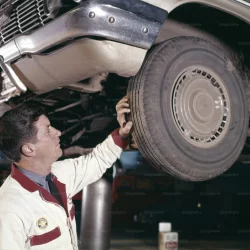The Most Common Car Buying Mistakes To Avoid

Are you in the market for a new car? Whether you're a first-time buyer or a seasoned veteran, purchasing a vehicle can be an exciting yet daunting experience. With so many options, deals, and factors to consider, it's easy to make costly mistakes. In this comprehensive guide, we'll explore the most common car buying mistakes and provide you with valuable insights to help you navigate the process with confidence.
Failing to Do Proper Research
One of the biggest mistakes car buyers make is jumping into a purchase without thorough research. This oversight can lead to regret and financial strain down the road.
Not Knowing Your Needs and Budget
Before you even step foot in a dealership, take the time to assess your needs and financial situation. Consider factors such as:
- Your daily commute and driving habits
- The number of passengers you typically transport
- Your storage and cargo requirements
- Your budget for monthly payments, insurance, and maintenance
By clearly defining your needs and budget, you'll narrow down your options and avoid being swayed by unnecessary features or vehicles that stretch your finances too thin.
Skipping the Test Drive
It's surprising how many people purchase a car without taking it for a proper test drive. This crucial step allows you to assess the vehicle's comfort, handling, and overall fit for your lifestyle. When test driving, pay attention to:
- Seat comfort and adjustability
- Visibility and blind spots
- Ease of entry and exit
- Noise levels and ride quality
- Performance in various driving conditions
Don't rush the test drive. Take your time and, if possible, test the car in conditions similar to your daily driving routine.
Overlooking the True Cost of Ownership
Many car buyers focus solely on the sticker price or monthly payments, overlooking the long-term costs associated with owning a vehicle.
Ignoring Fuel Efficiency
With fluctuating gas prices, fuel efficiency can significantly impact your budget over time. Consider the following:
- Compare MPG ratings of different models
- Factor in your typical annual mileage
- Calculate the potential savings of hybrid or electric vehicles
Remember that a car with a lower purchase price but poor fuel efficiency might end up costing you more in the long run.
Underestimating Insurance Costs
Insurance premiums can vary widely depending on the make, model, and year of the vehicle. Before committing to a purchase:
- Get insurance quotes for your top choices
- Consider the impact of safety features on premiums
- Factor in your driving history and location
Don't let an unexpectedly high insurance premium throw off your carefully planned budget.
Falling for Dealership Tactics
Dealerships employ various strategies to maximize their profits. Being aware of these tactics can help you avoid overpaying for your new car.
Focusing on Monthly Payments Instead of Total Cost
Salespeople often steer conversations towards monthly payments rather than the total cost of the vehicle. This tactic can lead to:
- Extended loan terms that increase overall interest paid
- Addition of unnecessary add-ons and warranties
- Overlooking the actual purchase price of the car
Always negotiate based on the total cost of the vehicle, and then discuss financing options separately.
Rushing the Process
Dealerships may create a sense of urgency, claiming limited-time offers or suggesting that another buyer is interested in the same car. Remember:
- Take your time to make an informed decision
- Be willing to walk away if you feel pressured
- Compare offers from multiple dealerships
A reputable dealer will respect your need for time and information.
Neglecting to Shop Around for Financing
Many buyers accept the first financing offer they receive, potentially missing out on better rates and terms.
Not Checking Your Credit Score
Your credit score plays a crucial role in determining the interest rates you'll be offered. Before car shopping:
- Check your credit report for errors
- Take steps to improve your score if necessary
- Understand how your score affects loan terms
A higher credit score can translate to significant savings over the life of your loan.
Failing to Get Pre-Approved
Getting pre-approved for a car loan before visiting dealerships offers several advantages:
- You'll know exactly how much you can afford
- You'll have leverage when negotiating with the dealer
- You can compare the dealer's financing offer with your pre-approval
Remember, dealerships often mark up the interest rate on loans they arrange, so having a pre-approval can help you secure a better deal.
Ignoring the Fine Print
The excitement of purchasing a new car can lead to overlooking important details in the paperwork.
Skimming Over the Contract
Take the time to carefully read and understand every aspect of the sales contract. Pay close attention to:
- The final purchase price
- Any additional fees or charges
- Warranty information
- Return or exchange policies
Don't hesitate to ask questions about anything you don't understand. A reputable dealer will be happy to explain the terms clearly.
Overlooking Gap Insurance
If you're financing or leasing a vehicle, consider gap insurance. This coverage protects you if your car is totaled or stolen and you owe more on the loan than the car's actual cash value. While it's an additional expense, it can save you from significant financial loss in certain situations.
Forgetting to Consider Used Cars
Many buyers automatically gravitate towards new cars, missing out on potential savings and value in the used car market.
Overlooking Certified Pre-Owned Options
Certified pre-owned (CPO) vehicles offer a middle ground between new and used cars. They typically come with:
- Extended warranties
- Thorough inspections
- Lower prices compared to new models
CPO programs can provide peace of mind and significant savings, especially on late-model vehicles.
Dismissing Private Party Sales
While dealerships offer convenience, private party sales can often result in better prices. However, when considering a private sale:
- Always get a vehicle history report
- Have the car inspected by a trusted mechanic
- Be prepared to handle paperwork and registration yourself
Private sales require more legwork but can lead to substantial savings.
Neglecting Post-Purchase Considerations
The car buying process doesn't end when you drive off the lot. Many buyers overlook important post-purchase aspects.
Skipping the Owner's Manual
Your vehicle's owner's manual is a wealth of information. Take the time to familiarize yourself with:
- Recommended maintenance schedules
- Proper operation of features and systems
- Warning indicators and what they mean
Understanding your vehicle can help you maintain it properly and avoid costly repairs down the line.
Forgetting to Plan for Maintenance
Regular maintenance is crucial for keeping your car running smoothly and maintaining its value. Factor in the costs of:
- Routine oil changes and tune-ups
- Tire rotations and replacements
- Major services at manufacturer-recommended intervals
Consider setting aside a monthly amount for maintenance to avoid financial strain when services are needed.
Conclusion
Avoiding these common car buying mistakes can save you time, money, and stress. Remember to do your research, take your time, and don't be afraid to ask questions or walk away from a deal that doesn't feel right. By approaching the car buying process with knowledge and confidence, you'll be more likely to drive away in a vehicle that meets your needs and fits your budget for years to come.
Whether you're looking for a practical commuter car, a family-friendly SUV, or a sporty weekend ride, these tips will help you navigate the car buying process like a pro. Happy car hunting!
More to Read:
Previous Posts:





